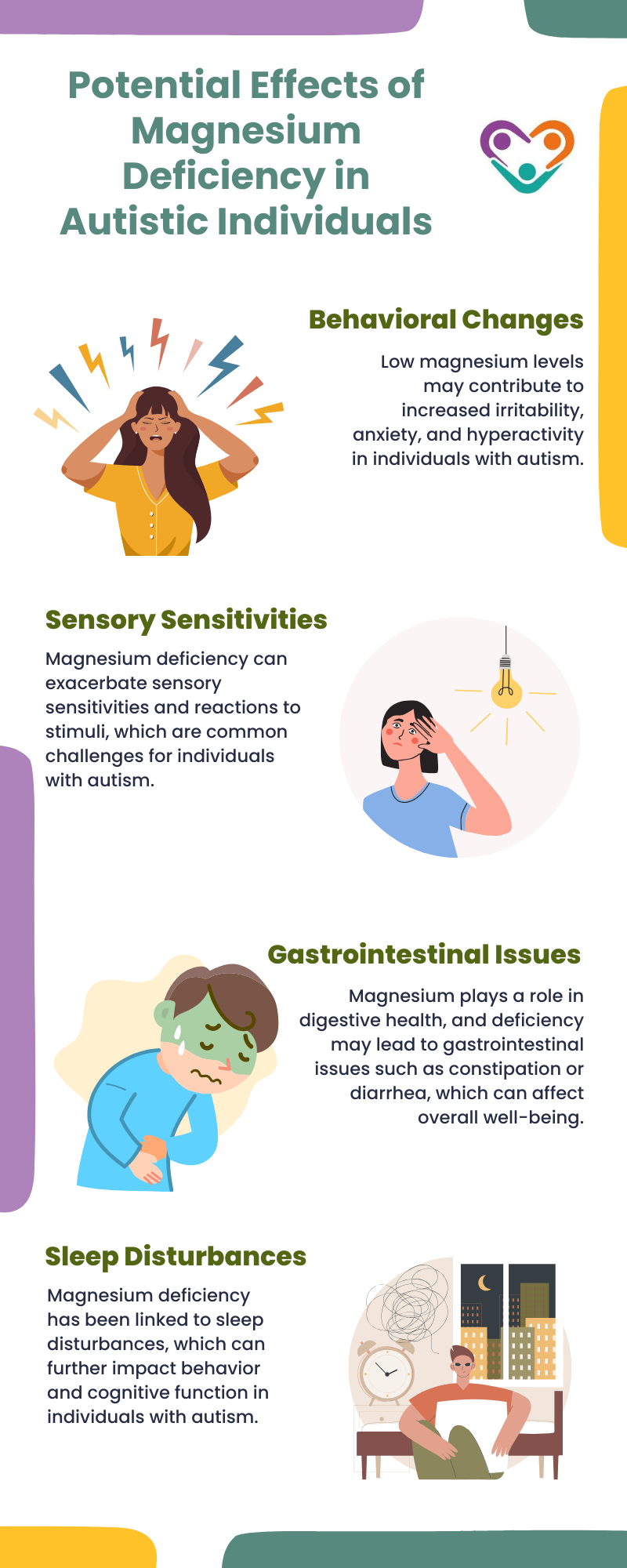
Table of Contents
Magnesium plays a vital role in keeping the body and brain functioning smoothly. It helps with everything from relaxing muscles to supporting a calm mind. However, when someone is low on magnesium, it can cause a range of issues, including irritability, anxiety, and sleep problems.
For autistic individuals, maintaining balanced magnesium levels may be even more important. Some studies suggest that magnesium deficiency might be linked to certain behaviors and challenges that people with autism experience.
Understanding this connection could offer new insights into how proper nutrition can support overall well-being in autism.
Exploring the Link Between Autism and Magnesium Deficiency
Recent research has suggested a possible link between autism and magnesium deficiency. Magnesium is crucial in various physiological functions, including neurological processes and brain health.
In individuals with autism, low magnesium levels may impact cognitive function, behavior regulation, and overall well-being.
Understanding the potential connection between autism and magnesium deficiency is a step toward exploring holistic interventions that may benefit autistic individuals. By acknowledging the significance of magnesium in the body and its influence on autism symptoms, caregivers and individuals can proactively consider strategies to address magnesium deficiency and optimize overall health and well-being.
Importance of Magnesium for Individuals with Autism
Understanding the significance of magnesium for individuals with autism is crucial in addressing potential deficiencies and supporting overall well-being. That said, let’s explore the role of magnesium in the body and the impact of magnesium deficiency on autism symptoms.
Magnesium is vital in numerous biochemical processes within the body, contributing to various physiological functions. Some key roles of magnesium include:
- Muscle Function: Magnesium is essential for muscle relaxation and contraction, which is important for motor skills and coordination.
- Nervous System: Magnesium supports the proper functioning of the nervous system, aiding in nerve transmission and maintaining overall brain health.
- Energy Production: Magnesium is involved in energy metabolism, helping to convert food into energy that the body can use.
- Regulation of Mood: Magnesium plays a role in regulating neurotransmitters that influence mood and emotional well-being.
Ensuring an adequate intake of magnesium is essential for maintaining these functions and supporting overall health, especially for individuals with autism who may have specific nutritional needs.
Moreover, magnesium deficiency can have a significant impact on autism symptoms and behaviors. Some potential effects of magnesium deficiency in individuals with autism include:

Recognizing the signs of magnesium deficiency and addressing them through proper dietary sources or supplementation can help alleviate these symptoms and improve the quality of life for individuals with autism.
How to Identify Magnesium Deficiency in Autistic Individuals
Identifying magnesium deficiency in autistic individuals is crucial as it can significantly impact their overall well-being. Recognizing the signs and symptoms of magnesium deficiency and undergoing appropriate diagnosis and testing for magnesium levels are essential steps in managing autism-related issues effectively.
Parents and caregivers have to be vigilant about the signs and symptoms that may indicate magnesium deficiency in individuals with autism. While these signs can vary from person to person, some common indicators to look out for include:
- Irritability: Increased irritability, agitation, or mood swings.
- Muscle Weakness: Weakness in muscles, tremors, or muscle cramps.
- Behavioral Changes: Changes in behavior patterns, including hyperactivity or increased anxiety.
- Sleep Disturbances: Insomnia, difficulty falling or staying asleep.
- Sensory Sensitivities: Heightened light sensitivity, sound, touch, or textures.
- Gastrointestinal Issues: Digestive problems such as constipation, diarrhea, or stomach pain.
If any of these signs or symptoms are observed, it is advisable to consult with a healthcare provider to determine the underlying cause, which may include magnesium deficiency.
Diagnosing magnesium deficiency in individuals with autism involves testing their magnesium levels through specific diagnostic procedures. Healthcare providers may recommend the following tests to assess magnesium status:
- Blood Magnesium Levels: Blood tests to measure the concentration of magnesium in the blood.
- Red Blood Cell Magnesium Test: Testing the magnesium levels within red blood cells, providing insights into long-term magnesium status.
- Urine Magnesium Test: Urine tests to evaluate the excretion of magnesium, indicating the body’s magnesium retention.
- Magnesium Loading Test: A specialized test to assess how the body responds to magnesium supplementation.
These diagnostic tests help healthcare providers determine the magnesium status of individuals with autism and guide them in developing personalized strategies to address any deficiencies detected.
Early detection and intervention play a crucial role in managing autism magnesium deficiency and promoting better health outcomes for individuals with autism.

How to Manage Autism Magnesium Deficiency
A dual approach involving dietary sources rich in magnesium and strategic magnesium supplementation can play a crucial role in managing symptoms and promoting the overall well-being of autistic individuals.
Incorporating magnesium-rich foods into the diet is a fundamental step in ensuring that individuals with autism receive an adequate intake of this vital mineral. By including a variety of magnesium-rich foods in daily meals, caregivers can help maintain optimal magnesium levels in the body.
That said, here are some common dietary sources of magnesium:
- Almonds
- Spinach
- Pumpkin Seeds
- Dark Chocolate (70-85% cocoa)
- Avocado
Incorporating these foods into the regular diet of autistic individuals can help them receive a natural and balanced intake of magnesium.
However, in cases where dietary sources alone may not provide sufficient magnesium levels, supplementation can be considered under the guidance of a healthcare provider. Magnesium supplements come in various forms, such as magnesium citrate, magnesium glycinate, or magnesium oxide.
It is important to work closely with a healthcare professional to determine the appropriate type and dosage of magnesium supplement for each individual with autism.
Supplementation should be integrated into a comprehensive treatment plan, considering factors such as individual needs, existing health conditions, and potential interactions with other medications.
Regular monitoring of magnesium levels and symptom progression can help assess the effectiveness of supplementation and ensure that magnesium levels remain within a healthy range.
With a balanced approach that combines dietary sources rich in magnesium and strategic supplementation, caregivers can take proactive steps in managing autism magnesium deficiency and supporting the overall well-being of individuals with autism. For families seeking additional support, ABA services in New Jersey, Georgia, Indiana, and New York can provide valuable resources.
If you’re interested in learning more about how therapy can help your loved one, don’t hesitate to contact us at Golden Care Therapy today for personalized guidance and support.
Sources:
- What to Know Before Taking Medicine for Autism - October 4, 2024
- Is Risperidone Good for Autism? - October 4, 2024
- Exploring Glutathione Supplementation in Autism - October 4, 2024
